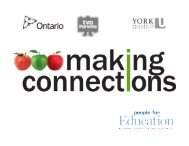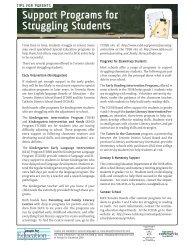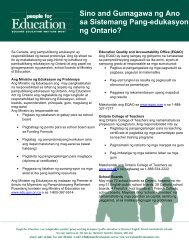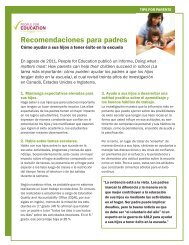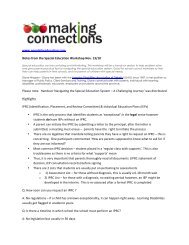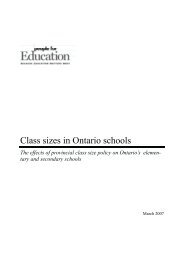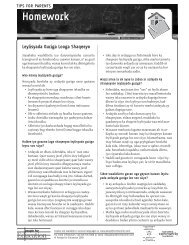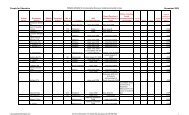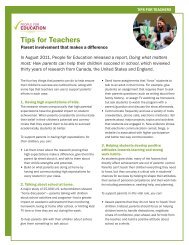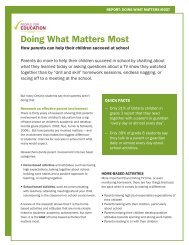Our Children Our Future Our Vision - People for Education
Our Children Our Future Our Vision - People for Education
Our Children Our Future Our Vision - People for Education
You also want an ePaper? Increase the reach of your titles
YUMPU automatically turns print PDFs into web optimized ePapers that Google loves.
<strong>Our</strong> <strong>Children</strong>, <strong>Our</strong> <strong>Future</strong>, <strong>Our</strong> <strong>Vision</strong><br />
based on the philosophy that since our education involves our children and our future, it must be<br />
also be done our way, according to our vision.<br />
At the same time, Canada has constitutional, treaty, and moral obligations to work with us as partners<br />
in the support and funding of our educational systems, but it will no longer be the one in control<br />
of the system itself. Going <strong>for</strong>ward, First Nations in Ontario will be the ones to determine how<br />
our education and curriculum will be designed and whether and how we enter into bi-lateral or<br />
tri-partite agreements. As always, we look to work with Canada in the treaty spirit of partnership to<br />
ensure appropriate recognition of our jurisdiction and equitable levels of funding to achieve these goals.<br />
To this end, First Nations in Ontario have embarked on a process to consult with our leaders,<br />
communities, experts, scholars, researchers, teachers, administrators, students and others to get<br />
critical feedback on how we can improve all aspects of education <strong>for</strong> our people. This has involved<br />
various activities like research, strategic planning and coordination, education conferences, sharing<br />
in<strong>for</strong>mation online, the Academic Think Tank on First Nation <strong>Education</strong>, and other in<strong>for</strong>mal<br />
measures to seek out input from those working in and affected by the system.<br />
We have only just begun this process as funding continues to be a major barrier. We see these<br />
initial steps and this report as preliminary steps in exercising our jurisdiction over the education of<br />
our peoples. We have much work left to do, however we believe that First Nations in Ontario are<br />
the best place to set the vision and make the decisions affecting our educational goals and outcomes.<br />
The following words are as relevant now as they were in 1972:<br />
The time has come <strong>for</strong> a radical change in Indian education. <strong>Our</strong><br />
aim is to make education relevant to the philosophy and needs of<br />
the Indian people. We want education to give our children a strong<br />
sense of identity, with confidence in their personal worth and ability…<br />
as a means of enabling us to participate fully in our own social,<br />
economic, political and educational advancement. 237<br />
We have been trying to address issues like jurisdiction and inequitable funding in First Nation education<br />
<strong>for</strong> many decades. Ever since residential schools were imposed on our people, we have consistently<br />
called <strong>for</strong> a new relationship between Canada and our Nations that respects our inherent<br />
right to be self-determining and our treaty rights in relation to education. The report, Indian Control<br />
of Indian <strong>Education</strong> was followed by the Report of the Royal Commission on Aboriginal <strong>People</strong>s<br />
(RCAP), then First Nation Control of First Nation <strong>Education</strong>; with many reports, studies, and articles<br />
published in between. 238 We do not need any more reports, research, or special Ministerial groups<br />
to study the problem; what we need now is action.<br />
237 Ibid. at 3.<br />
238 Ibid. RCAP, supra note 6. FNCFNE, supra note 108.<br />
53 Chiefs of Ontario



